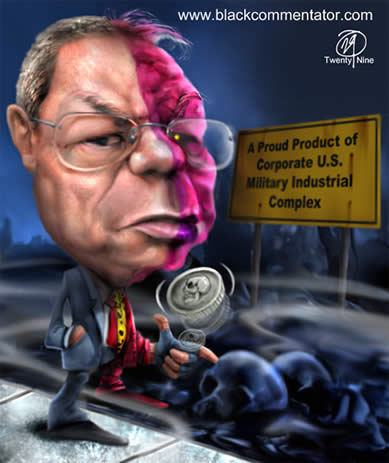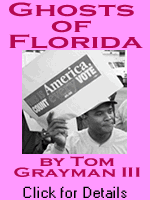
The resignation of Secretary
of State Colin Powell, was not unforeseen, but now allows us
to access the job the way
 we’ve
always seen it – now that his job is done. Of all of the “Neo-Cons,” War-Hawks,
and Arch-Conservatives around George Du[m]byah’s table, Powell
was often viewed as a “duck out of war,” a voice of moderation
in a pool of ideological extremists. As a “War Man” and a lifelong
soldier, he certainly had more credibility than any around the
table, in terms of the “art of warfare,” but his advise was rarely
followed on war issues. But it was his credibility as a diplomat
that made him valuable to Bush. Powell was the ultimate diplomat,
a man viewed as reasonable by the rest of the world at a time when
the United States came to be seen as hardline unilateralist. It
was Powell that most frequently fought with neo-cons Cheney, we’ve
always seen it – now that his job is done. Of all of the “Neo-Cons,” War-Hawks,
and Arch-Conservatives around George Du[m]byah’s table, Powell
was often viewed as a “duck out of war,” a voice of moderation
in a pool of ideological extremists. As a “War Man” and a lifelong
soldier, he certainly had more credibility than any around the
table, in terms of the “art of warfare,” but his advise was rarely
followed on war issues. But it was his credibility as a diplomat
that made him valuable to Bush. Powell was the ultimate diplomat,
a man viewed as reasonable by the rest of the world at a time when
the United States came to be seen as hardline unilateralist. It
was Powell that most frequently fought with neo-cons Cheney,

 Rumsfeld
and Wolfowitz, who saw war more of an economic opportunity than
a case for defense of our ideas. All Powell could do was buy Iraq
time. The war was a foregone conclusion. All Bush needed was somebody
to sell the idea. Because of their various motives and agendas
that conflicted with America’s truer interests, none of the neo-cons
could have sold this War on Iraq as a defensible strategy in the
fight against terrorism. But Powell could, and he did. That will
be the lasting question on Powell’s legacy as the first African
American Secretary of State: Was Colin Powell, and his credibility,
used to start the War In Iraq? Rumsfeld
and Wolfowitz, who saw war more of an economic opportunity than
a case for defense of our ideas. All Powell could do was buy Iraq
time. The war was a foregone conclusion. All Bush needed was somebody
to sell the idea. Because of their various motives and agendas
that conflicted with America’s truer interests, none of the neo-cons
could have sold this War on Iraq as a defensible strategy in the
fight against terrorism. But Powell could, and he did. That will
be the lasting question on Powell’s legacy as the first African
American Secretary of State: Was Colin Powell, and his credibility,
used to start the War In Iraq?


Knowing what we know now, and knowing what
Powell found out after the fact, the case could be made that
he was used. Now, understand,
we all give up something to get something else, so, in a sense,
everybody uses everybody, and most of the time – we know this to
be the case. Nobody is used who  doesn’t want to be used. Very few
people are used, unknowingly. Most just accept it as part of the
territory, part of “the deal.” Powell, having “future ambitions,” played
the role that he was given – as the moderate face of the party
and the messenger of America’s foreign policy agenda. The message
he ended up carrying for most of his term is one I’m sure he didn’t
anticipate when he signed up for the job. But like most “good soldiers,” he
kept to his commitment, even if he had to hold his nose all the
while. It was a nasty job, but somebody had to do it. So the President
sent Colin to sell the deal and Powell, thinking he had “the intelligence” to
back up “the sell,” put his credibility on the line – and the United
Nations reluctantly bought it, though no major governments were
brought in other than (what the world press labeled as, America’s “lap
dog”) Britain. Powell later found out that, not only were there
no weapons of mass destruction, he was sent out with flawed intelligence
and even to the post-report had flawed intelligence, all of which
Powell was forced to admit. Powell, who became known as “the good
and faithful soldier” of the administration, took the proverbial “bullet” for
the administration while Cheney, then Rumsfeld hid in the shadows,
and under Condi Rice’s skirt (figuratively), as their story unraveled
before the 9/11 Commission. Iraq is seen as a failed policy and
it was Powell who was forced to say it while Bush and the rest
of the Neo-Cons remain in denial. Yes, Colin Powell was a good
soldier, indeed. doesn’t want to be used. Very few
people are used, unknowingly. Most just accept it as part of the
territory, part of “the deal.” Powell, having “future ambitions,” played
the role that he was given – as the moderate face of the party
and the messenger of America’s foreign policy agenda. The message
he ended up carrying for most of his term is one I’m sure he didn’t
anticipate when he signed up for the job. But like most “good soldiers,” he
kept to his commitment, even if he had to hold his nose all the
while. It was a nasty job, but somebody had to do it. So the President
sent Colin to sell the deal and Powell, thinking he had “the intelligence” to
back up “the sell,” put his credibility on the line – and the United
Nations reluctantly bought it, though no major governments were
brought in other than (what the world press labeled as, America’s “lap
dog”) Britain. Powell later found out that, not only were there
no weapons of mass destruction, he was sent out with flawed intelligence
and even to the post-report had flawed intelligence, all of which
Powell was forced to admit. Powell, who became known as “the good
and faithful soldier” of the administration, took the proverbial “bullet” for
the administration while Cheney, then Rumsfeld hid in the shadows,
and under Condi Rice’s skirt (figuratively), as their story unraveled
before the 9/11 Commission. Iraq is seen as a failed policy and
it was Powell who was forced to say it while Bush and the rest
of the Neo-Cons remain in denial. Yes, Colin Powell was a good
soldier, indeed.

Secretary of State is usually seen as “the rose” of U.S. cabinet
position picks, but in the words of those famous hip-hop philosophers,
Outkast, “when you lean a little bit closer, roses really smell
like ‘doo, doo-doo’.” I’m sure that is part of  the reason Powell
is resigning. He got tired of the smell of this war, and you can
only hold your nose for so long. It’s Powell that’s come up smelling
like “doo, doo-doo.” I’m sure it’s going to take a few years to
wash the “stank” out his nostrils so the smell won’t still be around
for a possible presidential run in 2008. The best you can say about
Powell’s tenure as Secretary of State was that he tried to keep
his integrity intact, but it was a pretty “smelly” run. Particularly
when you were used the way he was used, to start a war that the
world knew was a sham from the outset. Colin Powell served his
purpose for Bush – to finish the war that he (Powell) and Bush’s
daddy didn’t finish in 1991. It’s still not finished, but it wasn’t
because Powell didn’t try. He was “the messenger” in America’s
misguided war message. the reason Powell
is resigning. He got tired of the smell of this war, and you can
only hold your nose for so long. It’s Powell that’s come up smelling
like “doo, doo-doo.” I’m sure it’s going to take a few years to
wash the “stank” out his nostrils so the smell won’t still be around
for a possible presidential run in 2008. The best you can say about
Powell’s tenure as Secretary of State was that he tried to keep
his integrity intact, but it was a pretty “smelly” run. Particularly
when you were used the way he was used, to start a war that the
world knew was a sham from the outset. Colin Powell served his
purpose for Bush – to finish the war that he (Powell) and Bush’s
daddy didn’t finish in 1991. It’s still not finished, but it wasn’t
because Powell didn’t try. He was “the messenger” in America’s
misguided war message.
Anthony Asadullah Samad is a national columnist,
author and managing director of the Urban Issues Forum. His upcoming
book, 50 Years After Brown: The State of Black Equality In
America is due out in 2004. He can be reached at www.AnthonySamad.com. |



































